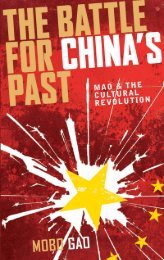Adam Smith's Critique of International Trading ... - Political Theory
Adam Smith's Critique of International Trading ... - Political Theory
Adam Smith's Critique of International Trading ... - Political Theory
You also want an ePaper? Increase the reach of your titles
YUMPU automatically turns print PDFs into web optimized ePapers that Google loves.
Muthu / Smith’s <strong>Critique</strong> <strong>of</strong> <strong>International</strong> <strong>Trading</strong> Companies 193<br />
companies is straightforwardly a moral and humanistic critique, one that<br />
aims to show that the very humanity <strong>of</strong> countless individuals has been<br />
degraded by the actions <strong>of</strong> powerful companies and their client-states.<br />
This is one <strong>of</strong> the key moral foundations, then, <strong>of</strong> many <strong>of</strong> Smith’s arguments<br />
about international political economy, and it informs in an important<br />
way the two historical stories that Smith tells at great length in the Wealth<br />
<strong>of</strong> Nations. 18 The first <strong>of</strong> these is the one that is described as the historical<br />
narrative <strong>of</strong> WN and has been much discussed by scholars, no doubt in part<br />
because it fits very easily into popular understandings about Enlightenment<br />
theories <strong>of</strong> commerce and philosophies <strong>of</strong> history. This is the largely optimistic<br />
and familiar story with which Smith details the slow but steady liberation<br />
<strong>of</strong> the commercial spirit and <strong>of</strong> entrepreneurial energies from the<br />
shackles <strong>of</strong> guilds, debt bondage, and other forms <strong>of</strong> premodern and early<br />
modern practices and prejudices. This first story is also, in its latter stages<br />
in particular, a European one—the full narrative takes place in the domestic<br />
societies <strong>of</strong> western Europe, as Smith discusses at length in Book III <strong>of</strong><br />
WN. Moreover, this is a narrative that has largely already unfolded, and it<br />
owes a great deal to the four-stage conjectural histories that Scottish<br />
Enlightenment thinkers sometimes theorized, a (usually) progressive set <strong>of</strong><br />
changes from savage to barbarian to civilized, and finally to commercial<br />
societies. 19 The development that Smith discusses is meant to indicate that<br />
historically there has been an increasing realization <strong>of</strong> the right to free commerce<br />
within European societies. 20 For Smith, the rise <strong>of</strong> commercial societies<br />
in much <strong>of</strong> Western Europe is by no means a thoroughly positive<br />
development, but on balance the many gains outweigh the distinctive problems<br />
that characterize commercial communities.<br />
Yet there is another narrative <strong>of</strong> historical development that Smith<br />
relates in the Wealth <strong>of</strong> Nations. In this tragic account <strong>of</strong> the development<br />
<strong>of</strong> the modern world, Smith situates himself in the midst <strong>of</strong> significant<br />
changes and notes that it remains far from clear where these developments<br />
will lead. This second historical narrative is not primarily European in<br />
focus but instead is genuinely global in scope, and for Smith it begins in the<br />
1490s as a result <strong>of</strong> the Spanish conquests <strong>of</strong> the Americas and the opening<br />
<strong>of</strong> the first direct oceanic trade route to India. Smith’s account is searingly<br />
critical, for he aims to analyze the injustices, inefficiencies, and moral<br />
calamities brought about over three centuries in light <strong>of</strong> the transcontinental<br />
and ultimately global interconnection <strong>of</strong> societies. This dark and pessimistic<br />
commercial narrative details the institutionalized prejudices and imperious<br />
practices <strong>of</strong> transnational merchants, international joint stock companies,<br />
and the governments that have increasingly become controlled by them. 21 It
















